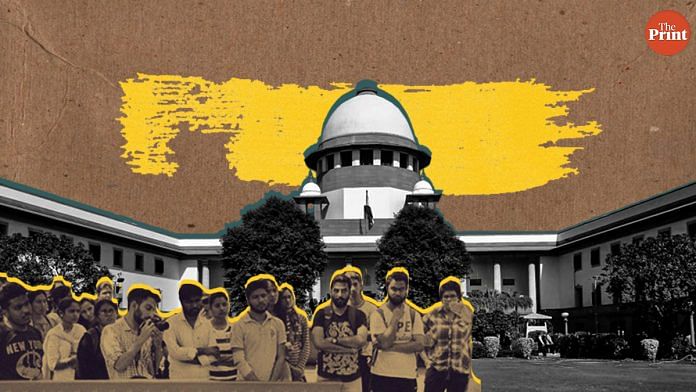The Supreme Court dismissed two petitions challenging an Allahabad High Court order that favoured department-wise reservations for faculty posts in universities as opposed to university-wide quotas for Scheduled Castes, Scheduled Tribes and Other Backward Classes.
ThePrint asks: SC okays dept-wise faculty quota: Harms university reservation or even spread of jobs?
Department-wise quotas is an attack on the very idea of reservations
 Vimal Thorat
Vimal Thorat
Convenor, National Campaign for Dalit Human Rights and former professor, IGNOU
Department-wise quota will only lead to the shrinking of SC, ST and OBC seats in the university. What happens when there’s only one position in the department—how will reservation work out then? With the 13-point quota roster system, this would mean that there will hardly be any chance for a marginalised person to make it to the department.
This is yet another attempt to curtail Dalit and OBC representation in universities.
As it is, things don’t look too good for the marginalised communities. After all the talk about 10% quota for economically weaker upper castes, this move will also threaten the constitutionally guaranteed reservation meant for the truly oppressed sections. The general category has always had the major share of representation in the university faculty. But they still feel threatened by the few people from the marginalised communities who manage to make it to the faculty of central universities.
There are scores of positions in central universities meant for reserved categories that are lying vacant. In Delhi University itself, there are 5,000 posts meant for reserved categories that are empty. Instead of making genuine attempts to fill those posts, they implementing department-wise reservations.
This is an attack on the very idea of reservations, and the rationale behind it.
Fix vacancies first, only then department-wise faculty quota will be effective
 Manisha Priyam
Manisha Priyam
Associate Professor, National University for Educational Planning and Administration
The quota system in Indian universities is a phenomenon that pre-dates Independence. The argument was that education is the one tool, which will allow for social mobility of the lower castes. There was a feeling that the upper castes, who are so few in number, have captured all the jobs.
In that light, the Allahabad High court judgment is an important one. In principle, the idea that each department should be looked at as a unit and each department must abide by reservation policies makes complete sense. This could most definitely lead to a more equitable representation of the marginalised communities across departments.
But in practice, this might not work. There are varying kinds of quotas—for SCs, for STs, for OBCs, for the physically challenged. If we follow the roster system, one might not see all these quotas fulfilled in a single lifetime.
Department wise quotas can only be implemented once hiring is done on a regular basis. The bigger problem is that so many recruitments, across universities, have been hanging. What’s the point of talking about reservation when there is such a huge backlog of jobs? The number of vacancies in central universities alone is in thousands today. Once this is fixed, the department-wise faculty quota will be a sensible move.
Department-wise faculty quotas will alter the social composition of university faculty
 Prithvi Datta Chandra Shobhi
Prithvi Datta Chandra Shobhi
Social historian and professor, Karnataka State Open University
The Supreme Court ruling on faculty quotas in universities may lead to an even distribution of SC-ST-OBC faculty members in each department but it will surely and drastically reduce the number of reserved category faculty members throughout the university system.
The impact on entry level recruitment at the assistant professor rank may not be very drastic. However, senior positions such as associate professor and professor will not be open for reservation at all. This is because only every fourth position will be reserved for OBCs, seventh for SC and 14th for ST. Typically, each department has, if any, only one or two sanctioned professor posts and two or three sanctioned associate professor posts. So, the only path open for senior positions will be through promotions.
University recruitment is a complex issue and should ideally follow three important considerations: social representation through reservation; curricular and research goals of a department; and finally, research as well as pedagogical capabilities of a candidate. All three criteria should be considered in recruitment. However, university hiring has become a technical exercise in an increasingly hierarchical and centralized system. UGC guidelines and reservation quotas, continue to push out every academic and intellectual consideration into oblivion. So, the mission of the university is already in peril.
So, the SC ruling will have no impact on the intellectual mission of the university. It will surely alter the social composition of university faculty, particularly at senior positions.
All those who want the BJP to follow SC on Sabarimala case are asking govt to undo court decision on faculty reservation
 Sangit Ragi
Sangit Ragi
Professor of Political Science, Delhi University
The decision of the Supreme Court of India in favour of reservation roaster in the university and colleges has raised eyebrows both in the campus and outside. This is sure to kick up a political storm, given how the politics around reservation in the country works.
The court has said that departments rather than colleges and university should be treated as a unit. The court has endorsed the decision of the Allahabad High Court, which reasoned with the argument that taking college and university as unit would lead to a violation of the Supreme Court judgments in Indra Sahwney Case of 1992 – whereby in some situations, things may lead up to 100 per cent reservation in a particular unit.
All those so-called progressive forces who keep preaching to the BJP to follow the courts on Sabarimala case have now started asking the government to undo the decision of the court through legislative intervention. Since, the decision has not gone to their favour, they have started accusing the government of not taking up the case seriously in court. They are ignoring the fact that the UGC employed the best legal minds in the case. They have already started creating a political narrative to pressure the government saying that it is a decision to sustain the Brahminical dominance. So keep watching; universities in times to come will remain engaged less with production of knowledge and ideas and more with the politics on reservation.
Give us autonomy, let universities review status of representation across departments
 Apoorvanand
Apoorvanand
Professor of Hindi, Delhi University
The judgement of the Supreme Court would impact the applicants from the scheduled castes and scheduled tribes adversely. It is based on a flawed logic that the post of the professor of Geophysics is different from the post of the professor of English.
Representation of teachers from these social groupings is abysmally low across universities in India. A 2016 government report said seven of every 100 teachers in colleges and universities are from the disadvantaged castes. In absolute numbers, only 1.02 lakh — or 7.22 per cent — of the 14.1 lakh teachers in 716 universities and 38,056 colleges in the country were Dalits. Tribal faculty was just 30,000 or 2.12 per cent.
As per official data, there are 17,106 teaching positions at 41 UGC-funded central universities, of which 5,997 were vacant as of April 1, 2017. This roughly works out to 35 per cent vacant teaching positions.
The judgment would will reduce representation of SC, ST and OBC in all new recruitment to be done by the universities.
The best course is to club positions of the same level and then implement roaster. It would impact the chance of a fair distribution of teachers from the SC and ST in all the departments. It should also be left to the institutions to review from time to time the status of representation across departments and centres and implement reservation to make it more effective and equitable. To do this, universities and institutions will have to be given more autonomy.
By Fatima Khan, journalist at ThePrint. You can follow her on twitter @khanthefatima.




The hundred year old fake Dravidian Propaganda has now seeped in to the media. All they talk about is SC/ST/OBC and reservation. It is one thing for politicians to peddle it. But what is the compulsion for the media to peddle reservation and only RC point of view? What about the rest of the population? Are they consigned to third rate citizenship devoid of any rights and voice? It seems India is the only country in the world where the media actively incites hatred against a huge population. Ofcourse, it is all in the guise of political correctness.
Don’t worry, under the threat of caste extremist masquerading as weak, backward and marginalised, this decision of SC will also be overturned eventually just as it has been done since 1950s. Non-Reserved class Hindus will forever stay as mere residents and not citizens with Zero representation in Parliament and L.Assemblies. Media in the meantime can keep peddling the hate-instigating “centuries of oppression” theory.